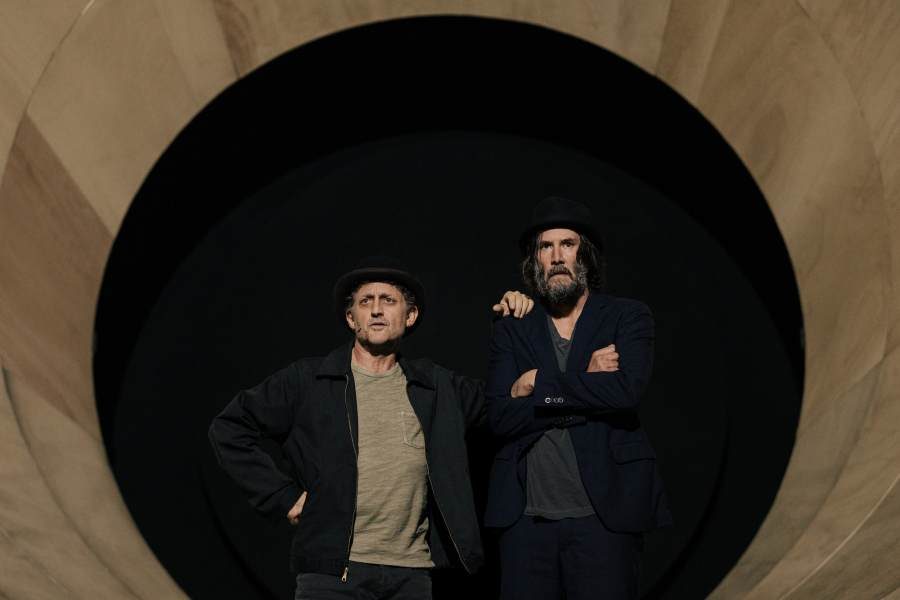

Is it Gah-Doh or GOD-dot? That was my first question upon receiving the invitation to see the revival of Samuel Becket’s classic play, “Waiting for Godot.” Director Jamie Llloyd opted for the latter, emphasizing the spiritual interpretation of the enigmatic play.
Two tramps, Estragon (Gogo) and Vladimir (Didi) wait each day for the elusive Godot to appear. They return each day, yet he never shows up. They spend their time repeating the same conversation day after day. Tedious for them, and sometimes for us. The dialogue repeats so their interactions are predictable. Estragon frequently says they should separate and Vladimir repeatedly comments that he will return.
Estragon (Keanu Reeves) and Vladimir (Alex Winters) meet up in what appears to be a huge marble cone-shaped tunnel (Scenic designer - Soutra Gilmour.) It has sloping sides which make it ideal for skateboarders. Later the characters slip and slide along the sides, attempting to stand up.
In Lloyd style, the production is somewhat sparse, stark and dark. There are no props. We don’t see the tree in the distance from which the two consider hanging themselves (except neither brings a piece of rope) When Didi gives his friend a carrot, a turnip or a radish, he pantomimes eating it.
Reeves and Winters, long time good friends and co-stars in “Bill & Ted’s Excellent Adventure" play the hapless pair. It is obvious from their interactions that there's a bond between them. “Together again at last! We have to celebrate this,” says Vladimir at the beginning. They even do Bill & Ted’s signature air-guitar riff, which delights the audience.
Attracting fans of "The Matrix” and the “John Wicks” series, Reeves is making his Broadway stage debut. He is stiff and awkward in a role that requires more of a lithe comic presence. He’s thin and wears an ill-fitting suit, and appears even more gawky. Nevertheless, his appearance is attracting thrilled fans of his movie work in “The Matrix” and the "John Wicks” series.
Winters, an experienced stage actor, is more polished and natural. He plays the ‘brighter’ of the two characters. When he gets to deliver a lengthy monologue in Act 2, he’s touching and sincere, especially in his care for his friend.
Their lives are tedious, boring and made up of waiting, so anything becomes a distraction. They call each other names, they exchange hats quickly in a Laurel and Hardy-like routine.
When Pozzo (a superb Brandon J. Dierden) appears with his slave Lucky (Micheal Patrick Thornton), it is a welcome distraction for all of us. Pozzo is bombastic with a swagger and a Southernish accent. Capricious and egoicentric. Dierden milks every word and gesture; he’s repellent yet magnetic.
After removing his hat, Estragon and Vladimir command Lucky to “Think.” Ironically Lucky goes into a lengthy monologue, some of which sounds esoteric and intellectual and some of it consisting of random syllables.
Over the years, the play has generated much discussion. Is Godot God and is Becket describing the futility of life? Do the two main characters represent the Id and the Eg? Students of the theater have written about the play and continue to do so. Pairs of male actors have tackled the roles including Robin Wiliams and Steve Martin, Ian McKellan and Patrick Stewart and Nathan Lane and Bill Irwin. Popular comedians have taken on the roles, recognizing the comic absurdity of the Estragon and Vladimir’s situation.
Done well, there is something about "Waiting for Godot"that speaks to audiences about life. One thing is for sure. if you don’t see it this time around you don’t have to “Wait for Godot “ to be revived for very long.
Hudson Theatre
141 W. 44th Street
New York, NY